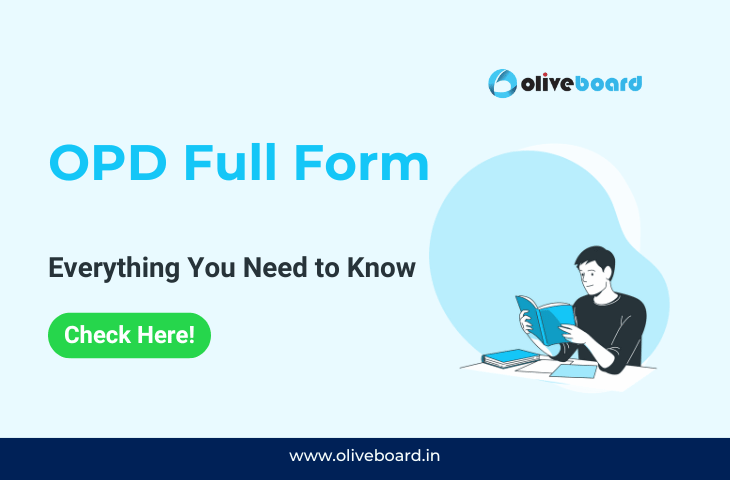OPD Full Form
OPD Full Form – OPD or Out-Patient Department is a term used in the healthcare industry to describe a department or section of a hospital where patients receive medical treatment or consultation without being admitted to the hospital as an inpatient. The OPD is an essential part of any healthcare facility, as it provides timely medical attention to patients who require medical care but do not require hospitalization. Patients visiting an OPD typically receive consultation, diagnosis, treatment, or routine check-ups from doctors or medical professionals. The OPD helps reduce the burden on inpatient departments, allowing them to focus on treating critically ill patients who require hospitalization. Overall, the OPD plays a crucial role in providing efficient and accessible healthcare services to the community.
OPD Full Form – What is the Full Form of OPD?
OPD stands for “Out-Patient Department.” It is a section or department of a hospital or healthcare facility where patients receive medical treatment or consultation without being admitted to the hospital as an inpatient.
In an OPD, patients typically visit doctors or medical professionals for diagnosis, treatment, or routine check-ups. The department is usually open during regular working hours and patients are seen on a first-come, first-served basis or by appointment.
The OPD is an important component of any healthcare facility as it allows patients to receive timely medical attention and treatment without the need for hospital admission. It also helps to reduce the burden on hospital inpatient departments, allowing them to focus on providing care to critically ill patients who require hospitalization.
OPD Full Form – What is the Difference Between Outpatient and Inpatient
Outpatient and inpatient are two terms used in the healthcare industry to describe different types of medical care and treatment.
Outpatient – Outpatient care refers to medical treatment or consultation received by patients who are not admitted to the hospital. These patients typically visit a clinic or medical facility for diagnosis, treatment, or routine check-ups and go home the same day. Outpatient care is less intensive than inpatient care and is typically less expensive.
Inpatient – Inpatient care, on the other hand, refers to medical treatment or care received by patients who are admitted to the hospital. These patients require close monitoring and intensive medical care and treatment, which cannot be provided on an outpatient basis. Inpatient care involves staying in the hospital for an extended period and may require surgeries, specialized tests, or other procedures.
The main difference between outpatient and inpatient care is the level of intensity and the duration of care required. Outpatient care is generally less intensive and shorter in duration, while inpatient care requires more intensive and extended medical care and treatment. The cost of inpatient care is usually higher than outpatient care due to the higher level of medical attention required.
- IBPS PO Vacancy 2025 Out, 5208 Vacancies Released, Latest Update
- Effective Study Strategies for the PFRDA Grade A Statistics
- Antonyms for SSC CHSL, Attempt 40 Questions Practice Set & Know Tips
- SSC CHSL Court Clerk Vs Bank Clerk – Which Job is Better? Know Here
- SSC CHSL Vs Bank Clerk Exam, Which Is Easy To Crack? Check Details
OPD Full Form – Frequently Asked Questions
Ans. OPD stands for “Out-Patient Department.”
Ans. In an OPD, patients can receive medical consultation, diagnosis, treatment, and routine check-ups.
OPD refers to medical treatment or consultation received by patients who are not admitted to the hospital, while IPD refers to medical treatment or care received by patients who are admitted to the hospital.
| BAMS Full Form | AM and PM Full Form |
| ED Full Form | RNA Full Form |
| DNA Full Form | CTC Full Form |
| BCA Full Form | DP Full Form |
| CGPA Full Form | CBSE Full Form |

Hello there! I’m a dedicated Government Job aspirant turned passionate writer & content marketer. My blogs are a one-stop destination for accurate and comprehensive information on exams like Regulatory Bodies, Banking, SSC, State PSCs, and more. I’m on a mission to provide you with all the details you need, conveniently in one place. When I’m not writing and marketing, you’ll find me happily experimenting in the kitchen, cooking up delightful treats. Join me on this journey of knowledge and flavors!
